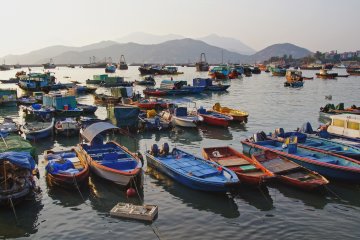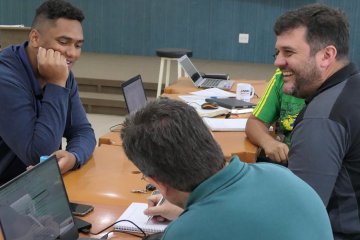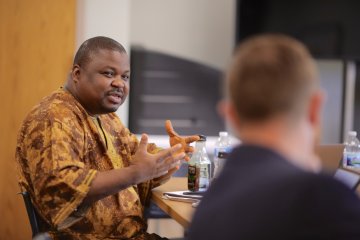Cyprian and Coronavirus
 Patrick J. O'Banion
Patrick J. O'BanionI was talking with a friend who's a financial advisor a few days ago. The Dow was down more than 2,000 points—spread of the Coronavirus and the attendant disruption of global travel and commerce had converged with a price war on oil to send the markets into freefall. He'd spent the day calling clients and assuring them that, longterm, the economy would rebound. "How are they responding?" I asked. He replied that he'd seen a marked difference between believers and unbelievers. The former tended to hold less tightly to wealth as the source of their confidence and so could take the ups and downs in stride.
Coincidentally, the treatise "On Mortality" by Cyprian of Carthage (d. 258) was open on my desk during the conversation. I'd been reflecting on the Coronavirus and the fear that had taken root in the hearts of so many people, myself included. As a teacher with Training Leaders International, my work normally revolves around traveling to and teaching in places where Christ's body is growing quickly but where theological education for pastors and church leaders is lacking. Many of those places require long flights (hours of breathing recycled air), long layovers (rubbing shoulders with potentially infected strangers), and in-country sojourns (in conditions that sometimes fail to reach my sanitary comfort zone). In the few days since then, the reality of the pandemic has come crashing down on the United States, and TLI has suspended all travel for the foreseeable future.
I've spent time learning about the disease and am closely monitoring its spread. My family is learning to wash hands for twenty seconds in warm, soapy water. We try not to touch our faces with our hands. We've got plenty of paper products. We're as ready as anyone, right? Time to hunker down.
Cyprian had a different approach. He was bishop of the city of Carthage, in modern day Tunisia, which was the heart of the early African church in the mid-third century. Those were hard days of persecution for the church—under Decius from 250–51 and then again under Valerian between 257–60. But they were tough days for Rome's entire Mediterranean empire more generally. Amid a protracted period of economic, political, and military crisis in the third century, a devastating plague broke out in the 240s. Cyprian described the effects in graphic terms:
"This trial, that now the bowels, relaxed into a constant flux, discharge the bodily strength; that a fire originated in the marrow ferments into ulcers of the throat; that the intestines are shaken with a continual vomiting; that the eyes are on fire with the injected blood; that in some cases the feet or some parts of the limbs are taken off by the contagion of diseased putrefaction; that from the weakness arising by the maiming and loss of the body, either the gait is enfeebled, or the hearing is obstructed, or the sight darkened."
Rather than exhorting Christians to stock up on toilet paper and wash their hands—or whatever the non-anachronistic analog would have been—Cyprian cast this moment as an opportunity for them to demonstrate the sufficiency of God's grace to them. "This finally is the difference between us and the others who do not know God, that they complain and murmur in adversity, while adversity does not turn us from the truth of virtue and faith, but proves us in suffering."
He even encouraged believers who had contracted the disease to see the foul experience as contributing to their sanctification. "What greatness of soul," he remarked, "it is to fight with the powers of the mind unshaken against so many attacks of devastation and death, what sublimity to stand erect amidst the ruins of the human race and not to lie prostrate with those who have no hope in God, and to rejoice rather and embrace the gift of the occasion."
Those who are "advancing to Christ by the narrow way of Christ" need not fear. We may well die—indeed, we certainly will unless Christ comes first—but our hope and home is in the heavenly places where we are, even now, seated with Christ (Ephesians 2:6; Colossians 3:1). Death is not our dread lord. But we might expect those who have no hope beyond this world to fear its grasp.
Cyprian invited his readers—and me as I read him; us if we will hear him—to reorient our perspective on this world and our place in it. For him, the plague, "horrible and deadly" as it was, had a "necessary" role to play: it "searches out the justice of each and every one and examines the minds of the human race." That is, it caused people's true colors to shine through as they determined how to act once the idols of their hearts were exposed.
The Coronavirus could do the same for us. It could be an opportunity for us to see our idols clearly, maybe for the first time, and to turn away from them and demonstrate that believing in Christ changes the way we live.
Are we caring for the sick? Are we extending hospitality? Are Christian employers showing compassion to their employees? Are Christian physicians caring for those who need help? Are the violent and greedy and proud among us changing their ways in the midst of this trial? Are the wealthy—even those who are infected—giving more to help those in need? Or are we too busy stocking up on Purell and facemasks? Are we, like the man Jesus described in Luke 12, more worried about filling our storehouses than we are about sharing with those who suffer? These are the sorts of questions that Cyprian asked of his readers. In doing so, he challenged them to treat the plague like an opportunity to "gladly seek martyrdom" and to "learn not to fear death."
Please don't misunderstand. Cyprian wasn't telling his audience to intentionally catch the plague in order to become martyrs. He wasn't one to urge irresponsible behavior, and I'm not either. There's great wisdom in us loving our neighbors by behaving in ways that will slow the spread of the Coronavirus, and we should always count the cost for those who rely upon us before we put ourselves in harm's way.
When the Decian persecution came to town Cyprian didn't run to the colosseum to offer himself to the lions. Rather, he went into hiding in order to continue his ministry among the suffering flock of Christ. But eight years later, when Emperor Valerian turned his wrath on those who would not confess Caesar as Lord, Cyprian found it was time to own Christ boldly. Urged by the proconsul Galerius to perform religious rites to the gods of Rome, the bishop refused and was sentenced to death by the sword. Cyprian thanked God as he went.
He understood that sometimes the Christian serves God by laying low; sometimes he serves God by standing tall. The same is true for us.
TLI believes that, right now, wisdom lies in temporarily pulling back from overseas travel, out of love for our neighbors and respect for our public health officials. But this doesn't mean our work is done. In fact, we'll all need to prayerfully consider what love and wisdom look like going forward as we seek to honor God in our specific callings and, more generally, be salt and light to those around us. But this is certain: citizens of the city whose Builder and Maker is God do not honor him by whimpering and huddling about. At this time we need the heavenly courage and compassion on display in Cyprian's life.
Patrick J. O'Banion (PhD, Saint Louis University) is a former professor of history and author of several books, including Deza and Its Moriscos: Religion and Community in Early Modern Spain and a new translation of Girolamo Zanchi's The Spiritual Marriage between Christ and His Church. He currently serves with TLI, teaching future pastors and church leaders in seminaries around the world.



